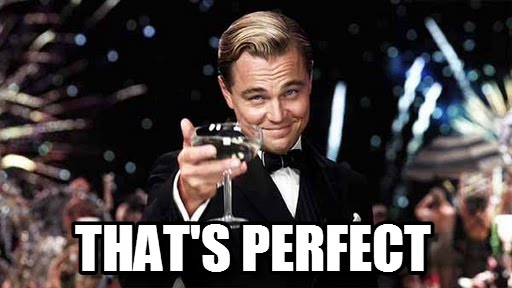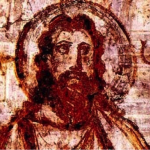Would God Create Perfect Creatures? – A Christian/Atheist Dialogue
by Dr. Randal Rauser
Filed under Atheism, God

EDITOR'S NOTE: Today we share a conversation between Randal Rauser and Justin Schieber. Randal is a Christian author, apologist, and professor of theology at Taylor Seminary (Edmonton, Alberta, Canada). Justin is the founder and host of Real Atheology, a popular atheist Youtube channel, and he's the former cohost of the Reasonable Doubts Radio Show and Podcast. Together, the two just released a book-length dialogue titled An Atheist and a Christian Walk into a Bar: Talking about God, the Universe, and Everything (Prometheus Books, 2016). I've read the book and highly recommend it to the entire Strange Notions audience, theists and atheists alike. It's smart, funny, substantial, and covers many contentious issues in fair and interesting ways. So pick up your copy now! Today's post below captures the book's spirit and the kinds of arguments it contains.
Justin: Well, Randal, we’ve officially made it out alive.
It’s been an interesting year. 2016 saw the somber losses of some of the most beloved names in popular culture as well as the death of sensible political discourse culminating with the election of a buffoon to the White House.
Randal: At least we bucked the trend toward polarization that increasingly characterizes the public square by actually talking to each other.
Justin: And yet, even after all our conversations and the publication of an entire conversational book, your theism and my atheism are still alive and kicking.
Randal: Yeah, but it should hardly be surprising. People don’t change their perspectives overnight, especially about such weighty matters as religion … or politics.
Justin: Very true. Thankfully, we didn’t approach this book with the sole purpose of changing each other’s mind. We made a point to step out of the trenches of the atheist/theist battlefield for a chance to engage in some doxastic diplomacy.
Randal: Hard to believe that after a couple hundred pages we were only getting started. So how about we pursue the conversation a bit further now? Any ideas?
Justin: I’ve got one. So, theists believe that God is the terminus of all explanation - that God is seated causally and logically prior to everything we know and everything we don’t (with the possible exception of abstracta like universals or numbers). I think most would also agree that God didn’t need to create any of this. In other words, if he exists, any act of creation that followed was a free choice rather than an act of necessity.
Randal: Sure.
Justin: Moreover, God is, in every way, perfect. In that light, we can be confident that, if God exists, then prior to creating anything, all that existed was pure perfection. But at present, there exists a universe made up of finite constituents.
That fact is more surprising on theism than it is on a view which states that the natural world is an uncreated, causally-closed system. Why? Because nearly every reason that we might appeal to in order to explain why God has created such a universe would far better motivate God to either refrain from creation acts altogether or create something entirely different.
Randal: So you think that we should expect God to create an infinite universe? I’m not sure I follow your reasoning here.
Justin: Not quite. I think that if God is to have reasons to create at all, those reasons would lead him to create one or more of what philosopher Evan Fales calls perfect creatures. A perfect creature is a person just like God in every way but whereas God is uncreated, a perfect creature is created. A perfect creature is maximal in his power, his knowledge, and most importantly, his moral perfection.
Randal: Okay, so your claim is that if God existed, he would create only perfect creatures. Since non-perfect creatures exist, that counts as evidence against God. But why do you think God would be restricted to creating only those perfect creatures?
Justin: It’s not so much because non-perfect creatures exist, although that’s also true. It’s because finite things exist generally. If God is to be taken as the quality standard of all things moral and ontological, then creating perfect creatures is going to best scratch any creative itch God might have given that these creatures are infinite and perfect in every way like their creator, God, the ultimate standard.
Randal: So you say. But if I can identify a possible divine “itch” which could not be scratched by creating perfect creatures, then that would constitute a defeater to your argument. So here’s one: by creating imperfect creatures who grow into moral perfection (or what Christians call being sanctified), God actualizes particular goods not available by creatures that are perfect from the beginning. These goods include the sense of moral history, of personal growth, of dynamic discovery, of learning to love and serve the creator. There are a whole range of goods God can actualize only by creating non-perfect creatures who have the capacity to grow. So what basis do you have to think God wouldn’t desire to actualize this range of goods?
Justin: Great question. So, let’s focus on your first suggestion; God’s itch to create persons who can grow into moral perfection requires him to create imperfect creatures. First, I don’t think it’s possible for finite persons to grow into moral perfection. But, let’s assume this is possible. To see the problem with this general approach, let me ask you a simple question. What’s so good about moral growth?
Randal: What’s so good about acquiring moral virtue? That strikes me as a strange question. It’s like asking what’s the value of climbing a mountain when you can be dropped off at the top via a helicopter. There is intrinsic virtue in undertaking the journey up the mountain. And there is intrinsic value in acquiring moral virtue over time. Why would you think otherwise?
Justin: My point is simple. Reasons for valuing moral growth in imperfect creatures that already exist are not the same as reasons to create imperfect creatures in the first place. So, without imperfect creatures already existing, there is no reason to create them to be imperfect. Moreover, the introduction of imperfect creatures will bring with them failures of moral will and the evil that results.
Randal: So you just made two points. First you said that the reasons for creating imperfect creatures would not be the same as valuing imperfect creatures that were already created. But this isn’t correct: the same valuation could be operative in both cases. If God values courage, for example, that could lead him both to create beings who acquire courage and to value creatures that presently exist who have acquired courage.
On the second point, you’re correct to observe that creating imperfect creatures who grow brings with it some degree of moral failure. But so what? You haven’t shown that the degree of moral failure outweighs the value of having creatures with a moral history who acquire virtue over time. And that’s what you need to show if you’re to sustain an objection to God’s existence based on the existence of imperfect creatures.
Justin: You’ve argued God could value courage and yet, you’ve provided no good reason to think that God does indeed value courage. All the reasons you have provided were extracted from the fact that courage and moral growth are very good things to have if we already exist as finite, imperfect persons. Moreover, if things like courage and moral growth are such great things, then God utterly lacking in both of these abilities should be seen as a fault, rather than a feature.
I’m afraid that appealing merely to the possibility of reasons for creating such beings won’t cut it against my inference to the best explanation. Abductive inferences allow for these possibilities. At best, you’d be adding finite value to an already infinitely valuable state of affairs and at worst, as already discussed, you’d be introducing the plenitude of evils we see resulting from the choices of imperfect creatures. With the choice of worlds before an infinite God, it isn’t even close. This is a piece of evidence against theism.
Randal: No surprise, I disagree. In closing I’d like to make three points of rebuttal. First, you said I’ve given no reason to think God values virtues like courage. But unless and until you can defend a sweeping skepticism about our moral intuitions, I think we remain justified in thinking that God would value courage in his creatures.
You also suggested that if a virtue like courage is valuable then God ought to exemplify courage. That’s incorrect: God is by definition omniscient and omnipotent, and no being who is all-knowing and all-powerful can exhibit courage. Thus, God cannot exhibit courage.
I’ll close with the main point. Your argument rested on the claim that if God were to create, he would create perfect creatures. I provided a reason to reject that claim, namely the goods that arise from creating imperfect creatures who grow into perfection. This very real possibility is sufficient to undermine your claim that God would only create perfect creatures.
Related Posts
Note: Our goal is to cultivate serious and respectful dialogue. While it's OK to disagree—even encouraged!—any snarky, offensive, or off-topic comments will be deleted. Before commenting please read the Commenting Rules and Tips. If you're having trouble commenting, read the Commenting Instructions.













